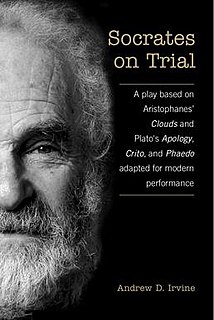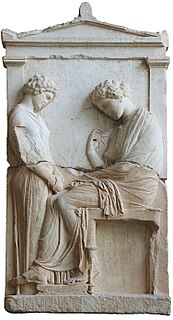Related Research Articles

Theramenes was an Athenian statesman, prominent in the final decade of the Peloponnesian War. He was particularly active during the two periods of oligarchic government at Athens, as well as in the trial of the generals who had commanded at Arginusae in 406 BC. A moderate oligarch, he often found himself caught between the democrats on the one hand and the extremist oligarchs on the other. Successful in replacing a narrow oligarchy with a broader one in 411 BC, he failed to achieve the same end in 404 BC, and was executed by the extremists whose policies he had opposed.
In ancient Greece, a metic was a foreign resident of Athens, one who did not have citizen rights in their Greek city-state (polis) of residence.

The History of the Peloponnesian War is a historical account of the Peloponnesian War, which was fought between the Peloponnesian League and the Delian League. It was written by Thucydides, an Athenian historian who also served as an Athenian general during the war. His account of the conflict is widely considered to be a classic and regarded as one of the earliest scholarly works of history. The History is divided into eight books.

Lysias was a logographer in Ancient Greece. He was one of the ten Attic orators included in the "Alexandrian Canon" compiled by Aristophanes of Byzantium and Aristarchus of Samothrace in the third century BC.
The Apology of Socrates, written by Plato, is a Socratic dialogue of the speech of legal self-defence which Socrates spoke at his trial for impiety and corruption in 399 BC.
The title of logographer was applied to professional authors of judicial discourse in Ancient Greece. The modern term speechwriter is roughly equivalent.
The ancient Greek word oikos refers to three related but distinct concepts: the family, the family's property, and the house. Its meaning shifts even within texts, which can lead to confusion.

Greek Homosexuality is a book about homosexuality in ancient Greece by the classical scholar Kenneth Dover, in which the author uses archaic and classical archaeological and literary sources to discuss ancient Greek sexual behavior and attitudes. He addresses the iconography of vase paintings, the speeches in the law courts, and the comedies of Aristophanes, as well as the content of other literary and philosophical source texts.

Pederasty in ancient Greece was a socially acknowledged romantic relationship between an adult male and a younger male usually in his teens. It was characteristic of the Archaic and Classical periods. The influence of pederasty on Greek culture of these periods was so pervasive that it has been called "the principal cultural model for free relationships between citizens."

Prostitution was a common aspect of ancient Greece. In the more important cities, and particularly the many ports, it employed a significant number of people and represented a notable part of economic activity. It was far from being clandestine; cities did not condemn brothels, but rather only instituted regulations on them.
Neaira, also Neaera, was a hetaera who lived in the 4th century BC in ancient Greece. She was brought to trial between 343 and 340 BC, accused of marrying an Athenian citizen illegally and misrepresenting her daughter as an Athenian citizen.
"On the Murder of Eratosthenes" is a speech by Lysias, one of the "Canon of Ten" Attic orators. The speech is the first in the transmitted Lysianic corpus and is therefore also known as Lysias 1. The speech was given by a certain Euphiletos, defending himself against the charge that he murdered Eratosthenes, after he supposedly caught him committing adultery with his wife. Euphiletos defends himself claiming that the killing of Eratosthenes was justifiable homicide, rather than murder. The case was heard before the Delphinion, the court which ruled on cases of justifiable homicide.

The liturgy was in ancient Greece a public service established by the city-state whereby its richest members, more or less voluntarily, financed the State with their personal wealth. It took its legitimacy from the idea that "personal wealth is possessed only through delegation from the city". The liturgical system dates back to the early days of Athenian democracy, but gradually fell into disuse by the end of the 4th century BC, eclipsed by the development of Euergetism in the Hellenistic period. However, a similar system was in force during the Roman empire.

The study of the lives of women in Classical Athens has been a significant part of classical scholarship since the 1970s. The knowledge of Athenian women's lives comes from a variety of ancient sources. Much of it is literary evidence, primarily from tragedy, comedy, and oratory; supplemented with archaeological sources such as epigraphy and pottery. All of these sources were created by—and mostly for—men: there is no surviving ancient testimony by Classical Athenian women on their own lives.

Socrates on Trial is a play depicting the life and death of the ancient Greek philosopher Socrates. It tells the story of how Socrates was put on trial for corrupting the youth of Athens and for failing to honour the city's gods. The play contains adaptations of several classic Greek works: the slapstick comedy, Clouds, written by Aristophanes and first performed in 423 BCE; the dramatic monologue, Apology, written by Plato to record the defence speech Socrates gave at his trial; and Plato's Crito and Phaedo, two dialogues describing the events leading to Socrates’ execution in 399 BCE. The play was written by Andrew David Irvine of the University of British Columbia and premiered by director Joan Bryans of Vital Spark Theatre Company in 2007 at the Chan Centre for the Performing Arts in Vancouver.

Slavery was an accepted practice in ancient Greece, as in other societies of the time. Some Ancient Greek writers described slavery as natural and even necessary. This paradigm was notably questioned in Socratic dialogues; the Stoics produced the first recorded condemnation of slavery.
"Against Neaera" was a prosecution speech delivered by Apollodoros of Acharnae against the freedwoman Neaera. It was preserved as part of the Demosthenic corpus, though it is widely considered to be pseudo-Demosthenic, possibly written by Apollodoros himself. The speech was part of the prosecution of Neaera, a hetaera who was accused of unlawfully marrying an Athenian citizen. Though the speech claims that the case was brought for personal reasons, the date of the prosecution has led scholars to believe that it was in fact politically motivated. In common with most legal cases from ancient Athens, the outcome is unknown.
In Classical Athens, there was no exact equivalent of the English term "adultery", but the similar moicheia was a criminal offence often translated as adultery by scholars. Athenian moicheia was restricted to illicit sex with free women, and so men could legally have extra-marital sex with slaves and prostitutes. Famously, Athenian culture and adultery laws considered seduction of a citizen woman a worse crime than rape.

Athenian democracy developed around the 6th century BC in the Greek city-state of Athens, comprising the city of Athens and the surrounding territory of Attica. Although Athens is the most famous ancient Greek democratic city-state, it was not the only one, nor was it the first; multiple other city-states adopted similar democratic constitutions before Athens.
Theoris of Lemnos was an ancient Greek woman from Lemnos who lived in Athens in the fourth century BC. She worked as a witch or folk-healer. At some point before 323, she was tried and executed along with her children, though the precise details of her offence are unclear. Three ancient accounts survive of her prosecution, which constituted the most detailed account of a witch trial to survive from Classical Greece.
References
- ↑ Scodel, Ruth. Lysias Orations I, III. Bryn Mawr: Bryn Mawr Commentaries, 1986.